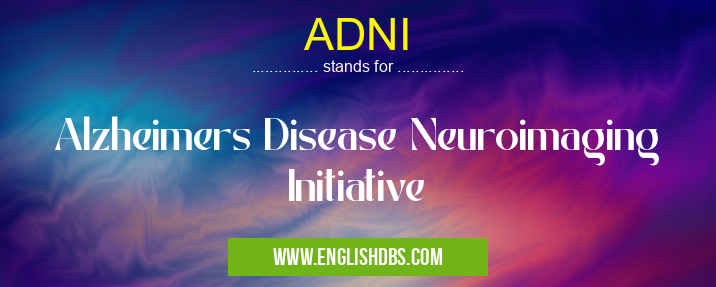What does ADNI mean in DISEASES
ADNI is an abbreviation that stands for the Alzheimers Disease Neuroimaging Initiative. It is a longitudinal study that has been collecting data on the progression of Alzheimer's disease (AD) since 2004. The goal of the ADNI is to identify biomarkers that can be used to diagnose AD early and to track its progression.

ADNI meaning in Diseases in Medical
ADNI mostly used in an acronym Diseases in Category Medical that means Alzheimers Disease Neuroimaging Initiative
Shorthand: ADNI,
Full Form: Alzheimers Disease Neuroimaging Initiative
For more information of "Alzheimers Disease Neuroimaging Initiative", see the section below.
What is the ADNI?
The ADNI is a collaboration between researchers from academia, industry, and government. The study includes participants from around the world who are at risk for or who have been diagnosed with AD. Participants undergo a variety of tests, including brain scans, cognitive assessments, and blood tests. The data from these tests are used to identify biomarkers that can be used to diagnose AD early and to track its progression.
The Importance of ADNI
The ADNI is an important study because it is one of the largest and most comprehensive studies of AD ever conducted. The data from the ADNI have helped to identify a number of biomarkers that are associated with AD, including:
- Beta-amyloid plaques: These are clumps of protein that form in the brains of people with AD.
- Tau tangles: These are twisted strands of protein that form inside neurons in the brains of people with AD.
- Hippocampal atrophy: This is a shrinkage of the hippocampus, a brain region that is important for memory.
The ADNI data have also been used to develop new methods for diagnosing AD and to track its progression. These methods are helping to improve the care of people with AD and their families.
Essential Questions and Answers on Alzheimers Disease Neuroimaging Initiative in "MEDICAL»DISEASES"
What is the Alzheimers Disease Neuroimaging Initiative (ADNI)?
ADNI is a longitudinal study that collects clinical, imaging, genetic, and biomarker data from individuals with Alzheimer's disease, mild cognitive impairment, and cognitively normal controls. It aims to identify early biomarkers and develop treatments for Alzheimer's disease.
What are the goals of ADNI?
The goals of ADNI include:
- Identifying biomarkers for early detection and tracking of Alzheimer's disease
- Understanding the progression of Alzheimer's disease
- Developing new treatments and interventions for Alzheimer's disease
- Promoting collaboration and data sharing among researchers
Who participates in ADNI?
ADNI participants include individuals with Alzheimer's disease, mild cognitive impairment, and cognitively normal controls. Participants are recruited from multiple sites across the United States and Canada.
What data is collected in ADNI?
ADNI collects a wide range of data from participants, including:
- Clinical data (e.g., medical history, cognitive assessments)
- Imaging data (e.g., MRI, PET scans)
- Genetic data (e.g., blood samples for DNA analysis)
- Biomarker data (e.g., cerebrospinal fluid for amyloid-beta and tau levels)
How can I access ADNI data?
ADNI data is available to researchers through the ADNI Data Portal (https://adni.loni.usc.edu/). Researchers must submit a data use agreement and create an account to access the data.
Final Words: The ADNI is a landmark study that has helped to advance our understanding of AD. The data from the ADNI have identified biomarkers that can be used to diagnose AD early and to track its progression. These methods are helping to improve the care of people with AD and their families.
ADNI also stands for: |
|
| All stands for ADNI |
